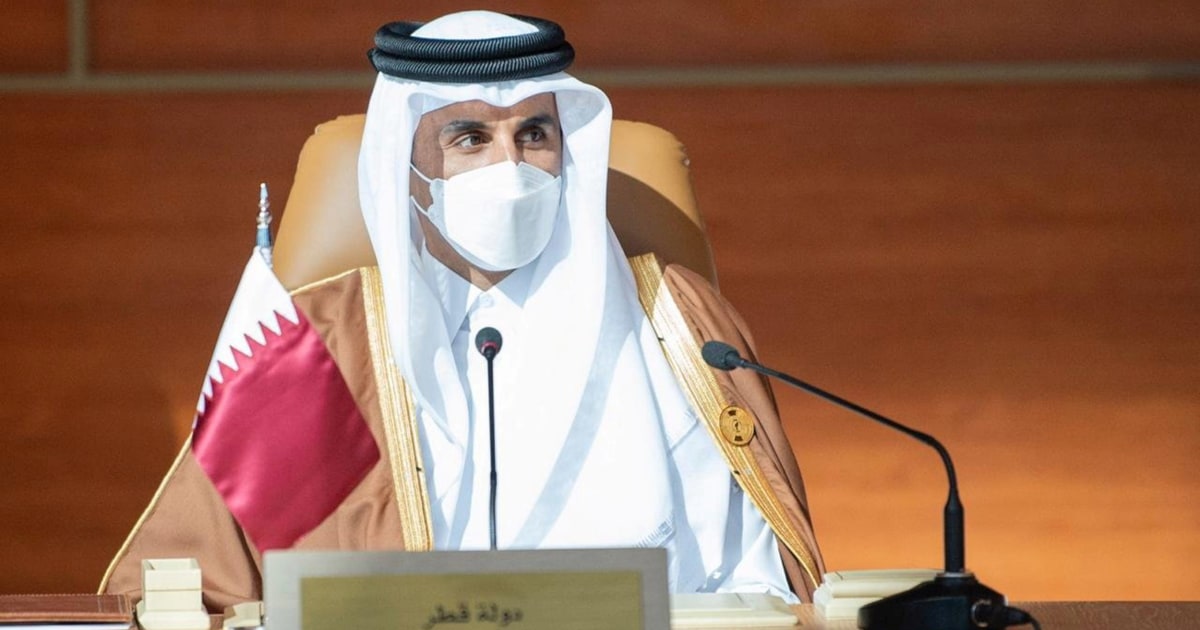LONDON – In a major thaw in relations, Saudi Arabian leaders and their regional allies reached a decisive agreement with Qatar on Tuesday, ending three and a half years of stalemate and restoring ties between neighbors in the Persian Gulf.
“We consider with great gratitude and appreciation efforts to remedy the breach,” Saudi Prince Mohammed bin Salman, the de facto leader of the kingdom, said in a statement, without elaborating on the terms of the so-called Al-Ula Agreement.
“We also commend, in this regard, the friendly efforts of the United States of America and all parties that have contributed.”
In a joint statement on Tuesday, leaders of the Gulf Cooperation Council (GCC) member states said the Al-Ula agreement aims to strengthen unity and cohesion among members and “the return of joint Gulf action to its normal course “.
Egypt, which is not part of the GCC, also signed the agreement.
This Tuesday morning, the Emir of Qatar, Sheikh Tamim bin Hamad al-Thani, arrived in the city of Al-Ula, in the Saudi desert, received with a hug by Mohammed bin Salman, in images broadcast live on Saudi TV.
Download the NBC News app for breaking news and politics
The agreement mediated by Kuwait and the United States, among others, took place at an annual summit of Arab Gulf leaders, attended by senior White House adviser Jared Kushner, along with Avi Berkowitz, special representative for international negotiations.
Saudi Arabia, Egypt, Bahrain and the United Arab Emirates severed diplomatic, commercial and travel ties with energy-rich Qatar in 2017, imposing a blockade that separated families and businesses and destroyed the Gulf unit.
The quartet accused Doha of supporting extremist groups in the region, including the Muslim Brotherhood, a charge it denies, and pointed to Qatar’s close relations with the regional enemy, Iran.
Prince Salman explicitly called Iran’s “destabilizing” activities in the Middle East at the summit.
“Today we are in dire need to join our efforts to advance our region and face the challenges that surround us, especially the threats posed by the Iranian regime’s nuclear program, its ballistic missile program and its destructive sabotage projects,” he told others. leaders.
Shortly after Tuesday’s announcement of the deal, Iran’s foreign minister, Javad Zarif, tweeted congratulations to Qatar for its “courageous resistance to pressure and extortion”.
“To our other Arab neighbors: Iran is neither an enemy nor a threat. No more scapegoats – especially with its reckless patron leaving,” he tweeted, in an apparent reference to President Donald Trump, who maintained close ties with Saudi Arabia and Egypt, among others, during his presidency while waging a maximum pressure campaign towards Iran.
The rivalry pitted the small Qatari monarchy against its former allies and fractured relations in the Middle East.
Qatar shares a huge offshore gas field with Iran and has restored full diplomatic ties with Tehran in the midst of the dispute, deepening the split with other countries.
On Monday, Kuwait’s foreign minister, Ahmad Nasser Al-Mohammad Al-Sabah, announced that Saudi Arabia would reopen its airspace and maritime and land borders with Qatar – in the most public measure to end the boycott Doha, which persisted despite calls from the United States for a resolution.
The move is the latest in a series of deals in the Middle East sought by Washington to build a united front against Iran.
It will likely be hailed as a victory in the last days of Trump’s term. All states are American allies. Qatar hosts the largest United States military base in the region, while Bahrain is home to the United States Navy’s Fifth Fleet, and Saudi Arabia and the United Arab Emirates host American troops.
“Today’s summit is very significant,” said Noha Aboueldahab, a foreign policy researcher at Brookings Doha Center, a study center. However, she warned, “it will take a long time to build and regain trust.”
Aboueldahab told NBC News that Qatar and Saudi Arabia still have historical tensions and divergent foreign policy views that are taking place in arenas including Syria, Libya and Egypt.
She also said that praise for Kushner’s mediation efforts was “laughable”. Adding that he and Trump were “as responsible for allowing this blockade to happen as the blocking countries themselves”.
Diplomats and analysts say Saudi is also pushing for an end to the crisis to show President-elect Joe Biden that Riyadh is open to dialogue. Biden promised to take a tougher stance with the kingdom on his human rights record and the ongoing war in Yemen.
The 2017 decision to break ties with Qatar has greatly shaken relations in the typically unified Persian Gulf.
The four Arab countries have published a list of 13 demands for Qatar to be welcomed back into the group. Among them, requests to close his Al-Jazeera news vehicle, close a Turkish base and lower ties with Iran.
Qatar said the boycott aims to restrict its sovereignty and said that any resolution must be based on mutual respect.
The wealthy peninsular nation is overweight on the world stage, which some analysts say has frustrated Saudi Arabia’s traditional regional dominance. Qatar will host the 2022 FIFA World Cup, is facilitating peace negotiations in Afghanistan and hosts some 10,000 American soldiers at the country’s Al-Udeid Air Base.
Reuters and The Associated Press contributed to this report.
Josh Lederman contributed.



